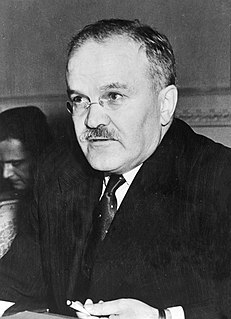A Quote by Vyacheslav Molotov
Our scientists all the more occupy advanced positions in the development of world science. By the example of their successes in the field of atomic energy, our scientists and technicians have vividly shown how much the increased might of the Soviet state and the further growth of its international authority depends on their efforts and practical successes.
Related Quotes
I want to make meditation an absolute for all students, whatever the subject they may be studying, so their awareness becomes more and more clean and clear. And out of that clarity we can create a beautiful world. Those scientists, if they are also meditators, will not create atomic bombs to destroy. They may use atomic energy to move trains so they don't pollute the air. They may use that atomic energy in the factories so they don't pollute air. Rather than killing man, the same atomic energy can be a tremendous help to save man and his future.
I don't think any administration, when they come in, thinks that their job is to tell the scientists what the science looks like or to be quiet about the science. Scientists need to remain true and not allow science to be politicized. Scientists are not politicians, and no politician should consider themselves to be a scientist.
Climate science has been targeted by a major political movement, environmentalism, as the focus of their efforts, wherein the natural disasters of the earth system, have come to be identified with man's activities - engendering fear as well as an agenda for societal reform and control... This greatly facilitates any conscious effort to politicize science via influence in such bodies where a handful of individuals (often not even scientists) speak on behalf of organizations that include thousands of scientists, and even enforce specific scientific positions and agendas.
One could count on one's fingers the number of scientists throughout the world with a general idea of the history and development of their particular science: there is none who is really competent as regards sciences other than his own. As science forms an indivisible whole, one may say that there are no longer, strictly speaking, scientists, but only drudges doing scientific work.
The great successes of the modern environmental movement in the '60s and '70s had laid the seeds of their failure in the early years of the 21st Century. They had built institutions filled with lawyers and scientists well suited to lobby policy makers who basically shared their world view. This worked well when liberals controlled the Congress and much of the federal bureaucracy, and when the politics of the time were more supportive of active government efforts to regulate the economy and clean up the environment.
The scientists who made the atomic bomb are, in my sense, people with a tragic destiny. You know, there was the US race with Nazi Germany and good evidence that the Germans were more advanced in nuclear physics, and we had to get the bomb first. But then there was the use of that dreadful weapon, or instrument of genocide, and many of the more sensitive scientists turned quickly into anti - nuclear people - and very effective ones.
To the scientists of the Renaissance, your critic was really your ally, helping you advance upon reality. Critics in science are not like drama critics, determining flops and successes. Criticism to scientists is just another means of finding out whether they're wrong, like running another experiment to see if it confirms or refutes a theory. Along with the advocacy principle of the courtroom, It is one of the best ways human beings have evolved to get closer to the truth.
Historians of a generation ago were often shocked by the violence with which scientists rejected the history of their own subject as irrelevant; they could not understand how the members of any academic profession could fail to be intrigued by the study of their own cultural heritage. What these historians did not grasp was that scientists will welcome the history of science only when it has been demonstrated that this discipline can add to our understanding of science itself and thus help to produce, in some sense, better scientists.
Although humans have existed on this planet for perhaps 2 million years, the rapid climb to modern civilization within the last 200 years was possible due to the fact that the growth of scientific knowledge is exponential; that is, its rate of expansion is proportional to how much is already known. The more we know, the faster we can know more. For example, we have amassed more knowledge since World War II than all the knowledge amassed in our 2-million-year evolution on this planet. In fact, the amount of knowledge that our scientists gain doubles approximately every 10 to 20 years.
The private motives of scientists are not the trend of science. The trend of science is made by the needs of society: navigation before the eighteenth century, manufacture thereafter; and in our age I believe the liberation of personality. Whatever the part which scientists like to act, or for that matter which painters like to dress, science shares the aims of our society just as art does.


































